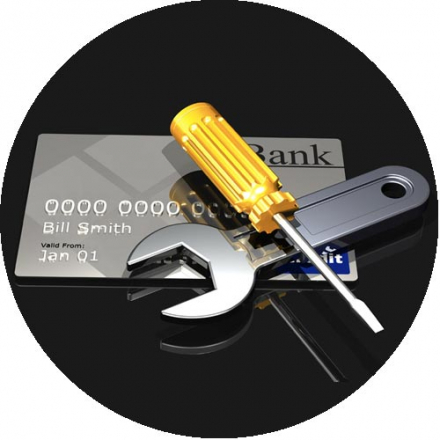Second Chance Credit Cards Explained

It’s easy to end up messing up your credit score. All it takes is a couple missed payments or accidental late payments, and before you know it, you’re in the poor and bad credit score range. Fortunately, with a little work and time, you can rebuild and repair your credit. Most people think this means that you automatically have to settle for secured credit card. However, you do have options with a second chance credit cards. If you are working on repairing past credit problems, here are some important things you should know about your options.
Unsecured vs Secured Credit Cards
You may not think there’s a big difference between unsecured and secured credit cards when you have bad credit. However, there is one feature that separates the two which requires hundreds of dollars. Secured credit cards typically require a security deposit of at least $250, which the card issuer or bank holds in case you default on your account. In the meantime, you receive a credit card with a credit limit in the amount of your security deposit.
Each card issuer offers different features, even with secured credit cards. For instance, certain secured cards allow you to earn interest on the security deposit while it is held. This allows you to build your security deposit a little so that when you get it back, you get a little more than you started with in the beginning. Other card issuers allow you to increase your security deposit by adding funds, which in turn, increases your credit line on the card. Depending on the issuer, you could also qualify for credit limit increases without adding to your security deposit.
Over time, as your payments are made, you can increase your credit score.
It’s important that you make sure the bank providing the card reports your account activity to the credit bureaus.
Once you have rebuilt your credit score, some card issuers even allow you transition into an unsecured card. In any event, as long as you follow the credit card terms, you can receive a refund of your security deposit once you improve your credit score and close the card account.
Rebuilding Credit with Credit Cards
One of the reasons you should use a credit card for rebuilding your credit is that as you manage your account responsibly, you can establish a positive credit history. If you have had credit problems in the past, you will find that it’s rather difficult being approved for most other types of credit. This is the primary reason that many people with low credit scores begin the process of rebuilding and repairing credit with a secured credit card, or with a second chance credit card with no security deposit.
Getting a Second Chance with No Security Deposit Cards
If you prefer a second chance without paying a security deposit, you might find that your options are a little limited when compared to the long list of secured credit cards that are available. However, it isn’t hopeless. There are cards available that you can use to repair your credit without paying a security deposit. One of the best ways to find out if you can qualify for a second chance with no security deposit card, choose one of the options that allows you to prequalify first.
Many of the prequalification options available will let you know which cards you qualify for without adding a hard inquiry to your credit report. Plus, if you don’t qualify in the prequalification process, the card issuer will usually provide options that you do qualify for that you can consider before applying.
Important Things to Consider When Choosing a Card
Before choosing any credit card, there are some important things you should consider. Because these types of cards are designed for those with bad credit, they can end up costing you quite a bit if you don’t manage them correctly. Some of the elements you should consider up front include the following:
- Annual fee. This fee can cost you as much as a hundred dollars per year, just to carry the card. This fee is a charge that you don’t get back, whether it’s a secured or unsecured credit card.
- High APR. Interest rates for these types of cards are typically higher than most. In order to save money on interest while you rebuild your credit you should make sure you pay your balance in full each month. Cards with high interest rates cost you more if you carry your balance from month to month.
- Extra fees. Cards for bad credit may also include additional fees. Make sure you are aware of the costs associated with your card before signing up.
- Credit reporting. Most importantly, check to ensure that your card account is reported to the credit bureaus. Otherwise it won’t do much to help you rebuild your credit. This is primarily the difference between secured cards, prepaid cards, and debit cards.
Best Credit Cards with No Security Deposit
If you’re considering a second chance card with no security deposit, some of the best cards to choose include the following:
This card isn’t primarily for rebuilding credit, but if you have had credit problems in the past, you could qualify for the Capital One® QuicksilverOne ® Cash Rewards Credit Card and build without a security deposit. This card is especially ideal for those with fair or average credit. You can earn unlimited 1.5% cash back on all your purchases. New cardholders can take advantage of 0% introductory APR on purchases and balance transfers for 9 months before a standard variable APR of 23.24% applies. There is no balance transfer fee or foreign transaction fee. The annual fee is $39.
Another great option is Total Visa® card
Earn 1% cash back rewards on payments made to your Total Credit Card
Checking Account Required
$300 credit limit (subject to available credit)
No security deposit, simply pay a one-time $95 program fee to open your account.*
User friendly Mobile App.
*See Rates, Fees, Costs & Limitations for complete offer details
See Total Card Visa Rewards Programs Terms & Conditions for details
Another card that is well-known for building credit without a security deposit is the Milestone® Mastercard® - Bad Credit Considered. This card has a fixed APR of 23.9%. You can see if you qualify for the card through its prequalification first. The annual fee is based on your credit and can range from $35 to $99.
Leave a comment
CREDIT SCORE UPDATES
exclusive members-only deals






